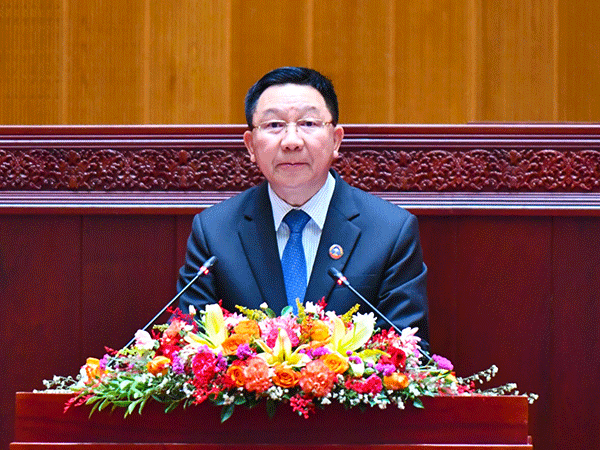 |
| Dr Linkham Duangsavanh speaks at the National Assembly. |
Agriculture ministry proposes Law on Cooperatives
A new Law on Cooperatives, which was submitted to the National Assembly (NA) for approval, would give farmers more opportunities to access financial and overseas markets, enabling them to expand their operations.
A draft of the law was presented to Assembly members on Wednesday by the Minister of Agriculture and Forestry, Dr Linkham Duangsavanh.
The law was drafted after numerous meetings among high-ranking officials to discuss the content.
The law spells out the principles, regulations and measures concerning the establishment, activities, supervision and monitoring of cooperatives to support and improve farming operations so that they grow and strengthen.
It aims to ease poverty and improve the living standards of Lao people of all ethnic groups so they can contribute more to the country’s economic and social development.
Lawmakers shared comments on how the law could benefit farmers in various ways and made suggestions about how the draft could be improved before being accepted.
The Law on Cooperatives has been formulated because, in the past, farming activities have largely been carried out by individuals in ways that were unregulated and did not conform to set standards.
But amid increasing competition in the production of goods and services, consumers and partner countries are demanding that goods be produced in greater quantities and are of better quality.
To be competitive in agribusiness, small-scale producers must team up to form larger entities, which would strengthen production capacity in rural areas and boost product quantity and quality to meet market demand.
In the past, there have been disputes concerning the production process, and there has been no centralised monitoring or management of farming operations.
“We need a clear reference for the expansion of overseas markets in line with socio-economic development in the new era,” Dr Linkham said.
If the law is enacted, it will be fundamental in the supervision of cooperatives, and more people are likely to have sustainable jobs.
The law will be used as a reference for local authorities, serve to attract foreign investment, help farmers obtain loans, improve people’s living standards and ease poverty, and contribute to socio-economic development,” Dr Linkham told Assembly members.
The draft Law on Cooperatives consists of 12 parts, eight chapters and 77 articles.
ByTimes Reporters
(Latest Update June 21, 2024)
|


